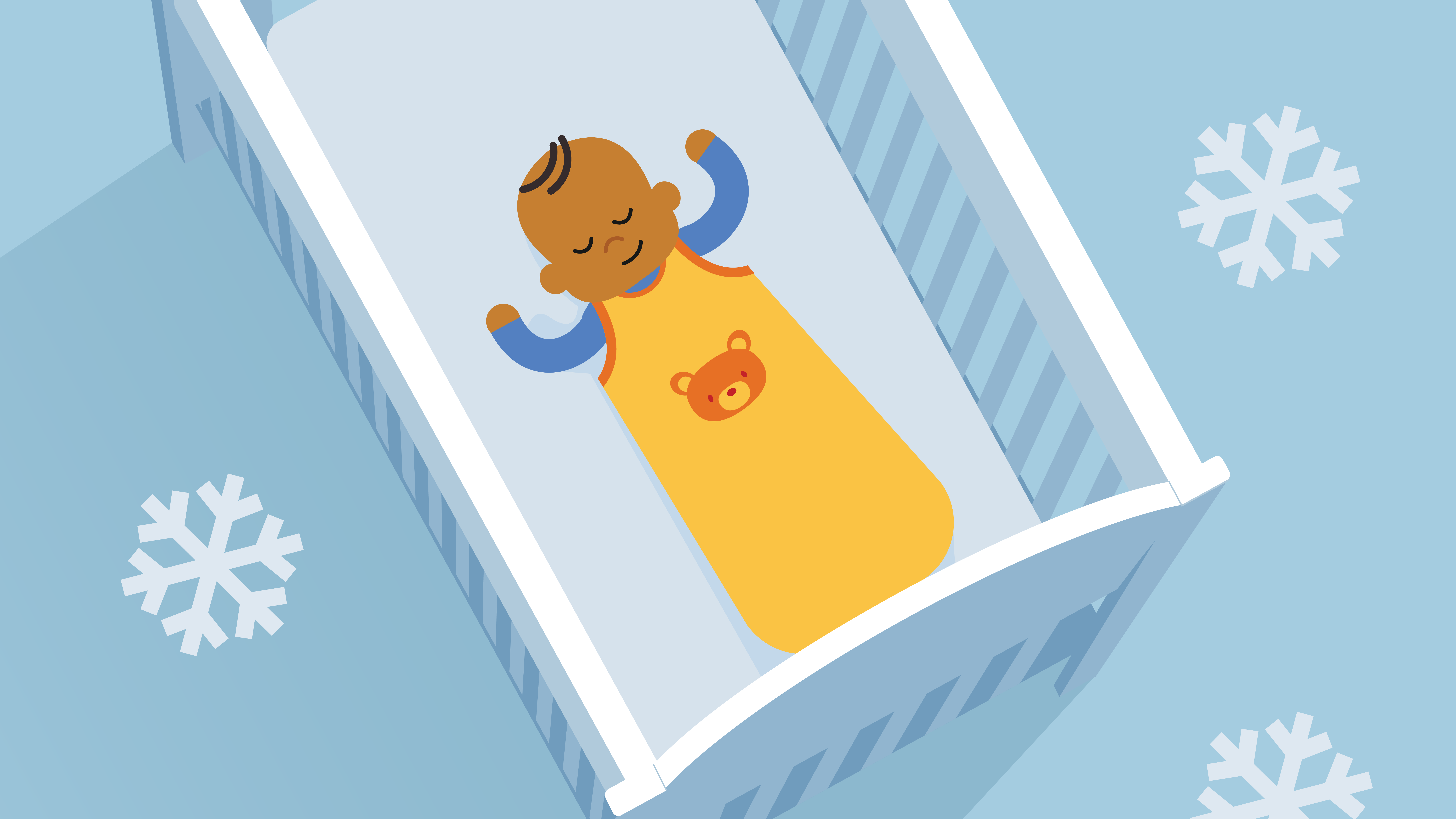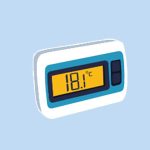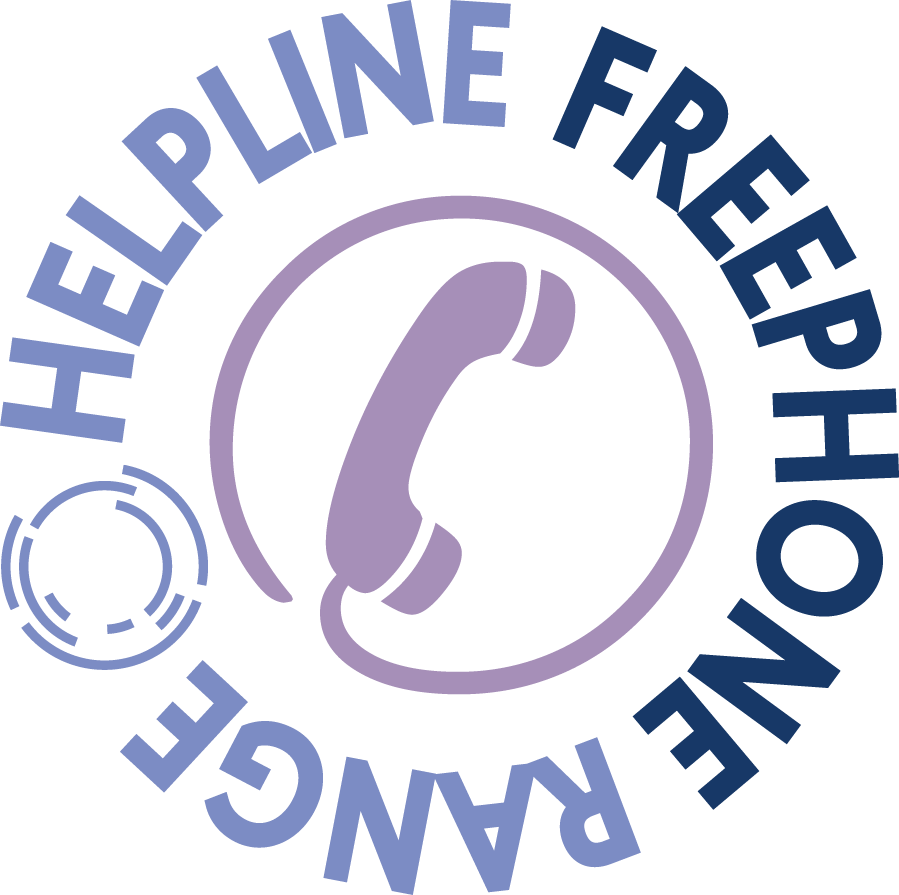
We know that the colder months can be difficult for families. You may be worried about the costs of living and have to make difficult choices for you and your family. Or you may be worried about paying your heating bills. You may be concerned about trying to keep your home warm, keeping draughts out and keeping your baby warm.
The recommended room temperature is 16-20 degrees, this may be difficult to maintain in the colder months. It can be tempting to wrap your baby up to keep them warm, however we know that overheating a baby increases the chances of SIDS (also known as cot death). Research shows babies are better to be cooler than too hot.
Things to consider for your baby and their sleep space during the colder months
Bedding for cots and Moses baskets
Sleep your baby in the feet-to-foot position with their feet at the bottom of the cot. Firmly tuck in sheets and blankets (no higher than the shoulders) to avoid the risk of your baby’s head becoming covered by loose bedding.
If you use sheets and/or blankets we recommend using lightweight and not thick, fleecy or padded blankets or duvets. If you think your baby is cold, add an extra lightweight blanket or layer of clothing
If you are using a baby sleeping bag, don’t add extra blankets on top, add an extra layer of clothing or choose a higher tog sleeping bag if you feel the sleeping bag is not enough. You can choose different togs for different seasons to help keep your baby at the right temperature. Baby sleeping bags should be well fitted, so the baby can’t wriggle down inside. Most sleeping bags are fitted according to a baby’s weight, rather than age. Always check the manufacturer’s guidelines for the baby sleeping bag that you choose.
Babies’ heads are an important way for them to lose heat if they need to so remove hats when inside.
Bedding and bedsharing
The safest place for a baby to sleep is in their own clear, flat, separate sleep space, such as a cot or Moses basket. However, we know that many parents find themselves bedsharing, whether they mean to or not, therefore it’s important to follow this advice.
When bedsharing, keep all adult bedding or any other items that could obstruct your baby’s breathing or cause them to overheat away from the baby. Don’t be tempted to put your baby under adult bedding to keep them warm. A high proportion of infants who die as a result of SIDS are found with their head covered by loose bedding. A baby sleeping bag is advisable when bedsharing.
Remember that the warmth generated by an adult in the same bed as a baby may create a warmer environment, so adjust bedding and/or clothing for your baby accordingly.
Follow all our other safer sleep advice to reduce the risk of SIDS. Put babies on their BACK for every sleep. In a CLEAR FLAT SLEEP SPACE. Keep them SMOKE FREE day and night.
To reduce the risk of accidents:
- Keep pillows and adult bedding away from your baby, along with any belts or cords from clothing
- Keep adult bedding at your waist height and add an extra layer of clothing if you are cold
- Remove slatted or decorative headboards
- Check that baby cannot become trapped in the bedframe or headboard, wedged, fall out of bed or get stuck between the mattress and the wall
- Don not bring other children or pets into bed with you
- Never leave your baby alone in an adult bed
It is important for you to know that there are some circumstances in which bedsharing with your baby can be very dangerous. You should never bedshare with your baby if any of the following apply:
- You or anyone in the bed smokes or the baby was exposed to smoking in pregnancy
- Either you or your partner has drunk alcohol or taken drugs (including medications that may make you drowsy)
- Your baby was born premature (before 37 weeks)
- Your baby was born at a low weight (2.5kg or 5½ lbs or less)
It’s best to have another adult on hand to help with baby if you are not well, have drunk alcohol or taken drugs that make you less aware than normal.
Things to avoid:
- Never sleep on a sofa or armchair with your baby. This can increase the risk of SIDS by 50 times
- Don’t use hot water bottles in any baby sleep space (cot, crib, Moses basket or adult bed) as they can make your baby too hot
- We would not advise using products like swings and baby bouncers as sleep spaces as they are not firm and flat
- Babies shouldn’t lie on or have anything soft around them, particularly their heads, as this can cause them to overheat and increases the risk of SIDS. Soft, squishy materials can get pressed against a baby’s mouth and nose and interfere with breathing
We do not recommend:
Cot Bumpers
They can pose the risk of an accident to babies and toddlers. There have been a number of cases in the UK and abroad where infants have become entangled in the ties and material, or fallen from pulling themselves up on the bumpers. Don’t be tempted to use them to make your baby’s sleeping environment cosier.
Weighted Blankets
Weighted swaddles, weighted blankets and weighted sleeping bags are not recommended for babies under 1 year due to risk of overheating and head covering.
Babies sleeping in hats, hoods or outdoor clothing
Babies lose heat though their heads so remove hats or hoods when indoors or in a car so they don’t get too hot. Babies shouldn’t sleep indoors in any outdoors clothing.
Placing your baby’s cot next to a radiator or having a heat source, like a portable heater, directly aimed at your baby
Babies are unable to regulate their temperature so could potentially end up getting too hot and are unable to move out of the way of a heat source.
Wherever your baby’s sleep space is, keep it clear, keep it simple, keep it safe.
How can I check if my baby is too hot?
All babies are different so we recommend checking your baby’s chest and/or back of their neck to make sure that their skin doesn’t feel clammy or sweaty to the touch (their hands and feet will always feel cold to touch.) Warm is fine, but if it feels sweaty or clammy it means they are too hot so remove a layer of bedding or clothing.
If your baby is unwell
Always seek medical advice if you are worried about your baby. We have a baby check app which feature 19 simple checks that you can do if your baby is showing signs of illness. Each check tests for a different symptom and when completed, a score is calculated that tells you how ill their baby is. The app then lets you know whether your baby needs to see a doctor or other health professional. Find out more about our Baby Check app.
Advice on how to help prevent infections in babies and the signs and symptoms to look out for.
Finding support
If you are worried about or struggling to pay your bills do seek help, the following may be able to help:
• National debt helpline
• Stepchange
If you are worried about feeding your family contact the Trussell Trust to find out more about how they can support you. There may also be local initiatives or community groups who can help with clothing and equipment for babies or help with school uniform for older children so do check this out too.


